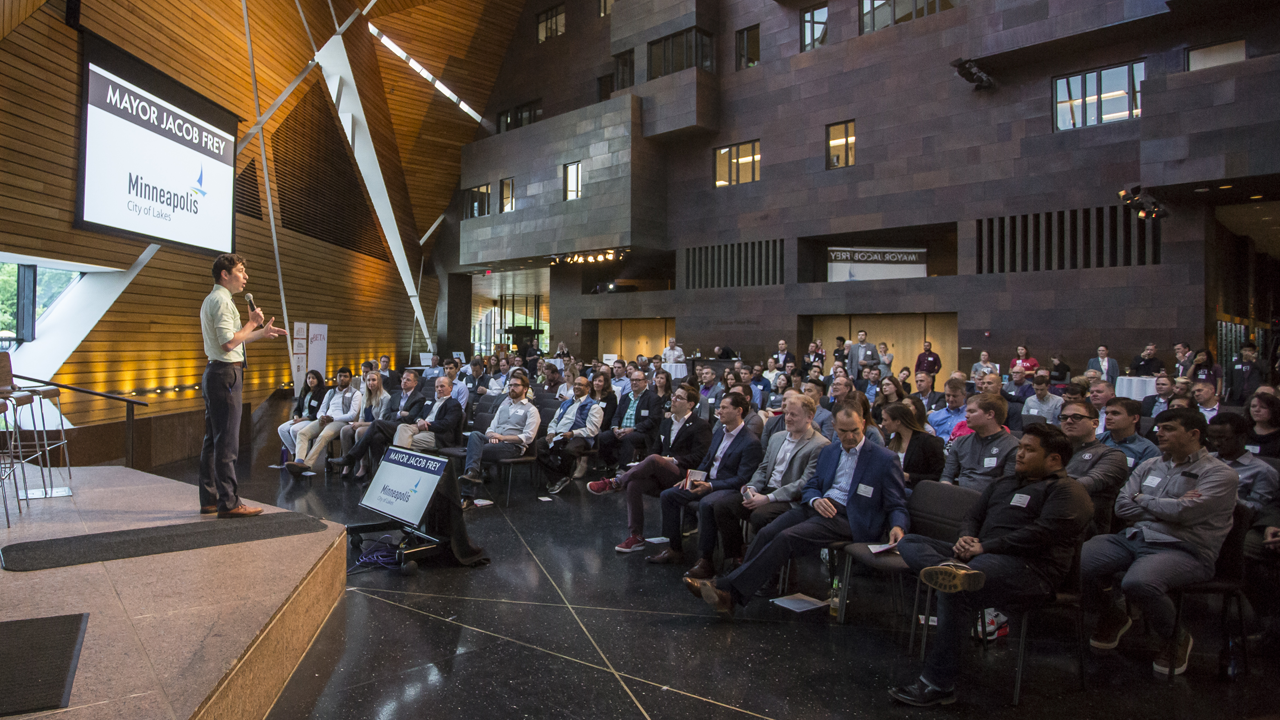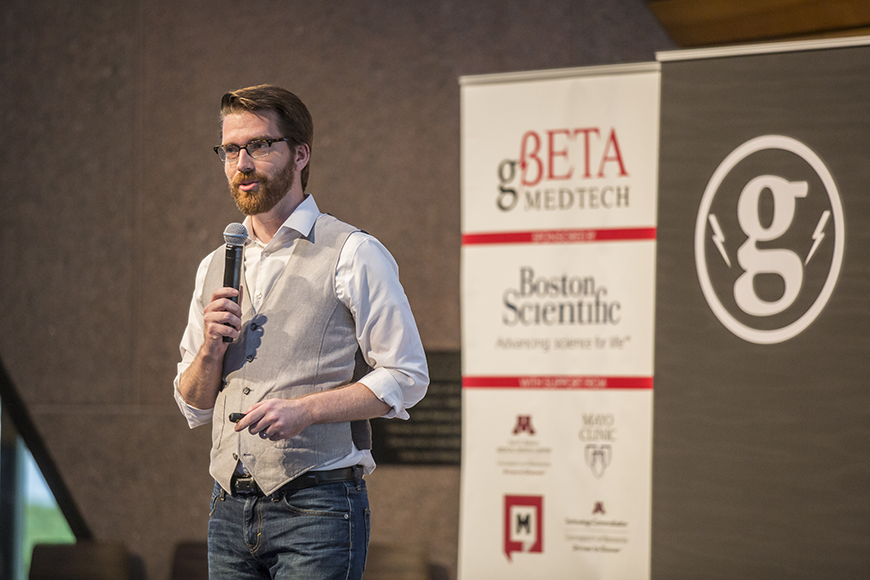
Minneapolis Mayor Jacob Frey addresses the crowd at LiveBETA Medtech, held on May 21 to celebrate startups in the gBETA Medtech accelerator program's spring cohort.
At the University of Minnesota, launching startup companies is one way for promising research innovations, from crop monitoring systems to new cancer therapies, to gain a foothold outside of academia. But growing a company after launch means overcoming a wide range of obstacles that can prove difficult for all but the most experienced entrepreneurs.
To help new startups overcome these challenges, programs called “accelerators” connect new companies’ CEOs with mentors to learn more about how to grow their business, reach customers, and attract additional investment. Accelerators give participating startups a chance to work closely with successful entrepreneurs, angel investors, venture capitalists, and industry experts, and can benefit nearly all U of M startups.
“Mentorship and support can help startups succeed as they work to bring research-based innovations beyond the lab to benefit the public,” said Russ Straate, associate director of the Venture Center, part of the U’s Office for Technology Commercialization. “Accelerators provide an immersive, hands-on resource for our startups at the U of M to acquire the knowledge and make the connections they need to overcome obstacles and achieve growth.”
This spring, two U of M startups took place in two related accelerator programs offered by gener8tor, a nationally ranked accelerator.
Green Energy from Organic Waste
While taking part in gener8tor’s gBETA program this spring, U of M clean energy startup enVerde worked to refine its messaging to better reach potential customers and investors. David Goebel, enVerde’s CEO, said input from accelerator mentors helped make how the company presented its service—converting organic waste into a source of sustainable energy—more compelling and easier to understand.
“Our network has gone several levels beyond what we would have normally been able to reach because of gener8tor’s established connections and, frankly, their credibility,” Goebel said. “They really subject you to a large number of mentors.”
enVerde creates synthetic gas, or “syngas,” from organic waste, which comes from a number of sources, including the forestry and agricultural industries. Syngas can power generators to produce electricity or heat, and it’s especially valuable as a fuel alternative in areas where natural gas isn’t readily available. Syngas can also replace some chemicals derived from fossil fuels in industrial and household products.
The technology behind the startup was invented by Paul Dauenhauer, Ph.D., associate professor of chemical engineering and materials science in the U’s College of Science and Engineering. The work also has roots in research by Lanny Schmidt, Ph.D., regents professor emeritus in chemical engineering and materials science, whom Dauenhauer worked under during his time as a doctoral student.
enVerde wrapped up its gBETA experience with a pitch at the LiveBETA event on March 8. To Goebel, gener8tor’s accelerator programs provide an important service to startups in the Twin Cities area.
“They have an extensive mentor network, and their process is very effective,” he said. “They filled a gap that existed in our business community.”
A Sound(less) Night’s Sleep

For Brian Krohn, Ph.D., being part of the first cohort to go through gener8tor’s new gBETA Medtech program—which mirrors gBETA but focuses exclusively on medical technologies—was an energizing experience.
“Finding ways to be a motivated learner is really at the core of being an entrepreneur,” he said. “Joining the accelerator was a great way to get a lot of motivation from other people.”
Krohn is CEO and co-founder of Soundly, which offers a smartphone game designed to reduce snoring through physical therapy. Instead of touching the screen to control the in-game character, users say the words “nee” and “naw.” Switching between these syllables tones the upper airway muscles that, when weak, lead to snoring. The app is based on technology Krohn developed while part of the Innovation Fellows program at the U’s Earl E. Bakken Medical Devices Center.
The gBETA Medtech program wrapped up on Monday with an event at the U’s McNamara Alumni Center, where Krohn and the four other CEOs pitched their companies to a room full of investors and entrepreneurs.
Through his gBETA Medtech connections, Krohn was able to connect with an expert at Lumos Labs, the company behind the brain-training program Lumosity. Krohn recognized the similarities between their approaches to digital, game-based therapies and was able to gather some tips from the contact on how to further develop Soundly’s app and grow its user base.
“Most of the things that you need to know, you don’t actually know,” Krohn said of being an entrepreneur. “You have to find people who have done it before or are doing it now.”
Photo credits: Alex Carroll, courtesy of gener8tor